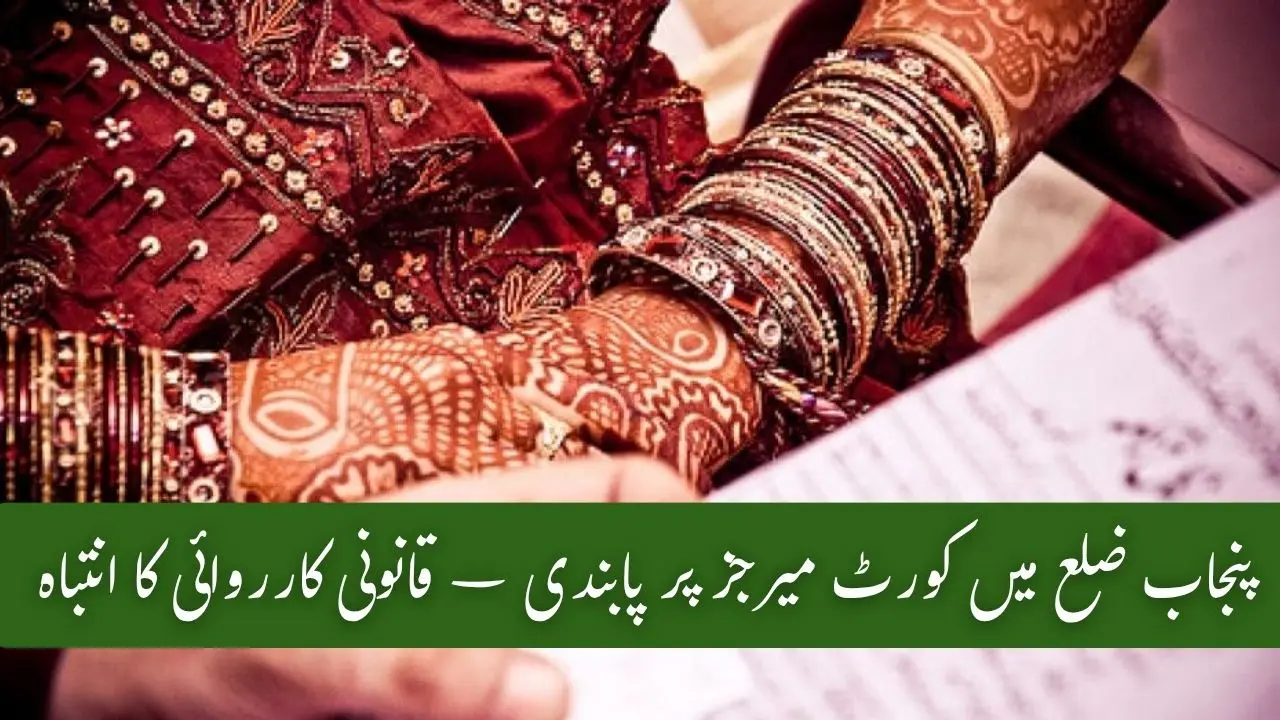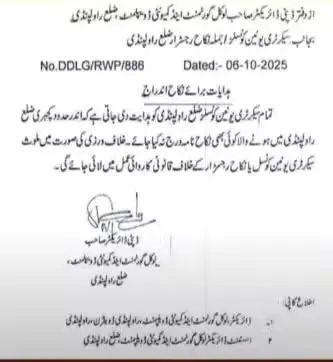Court Marriages Banned in Punjab District – Legal Action Warning Issued

In a significant move that has raised eyebrows across Punjab, Court Marriages Banned in Punjab District by the Deputy Director of Local Government and Community Development, Rawalpindi. This new directive mandates that Union Council secretaries and Nikah registrars cease processing marriage certificates within the Katchery (court complex) of Rawalpindi, creating a dramatic shift in the marriage registration process. The government has cited legal and procedural concerns, stating that this move is intended to bring more regulation to the growing trend of court marriages within the region.
The prohibition on court marriages has sparked mixed reactions from the public. While some believe it is a necessary step to regulate marriage procedures and safeguard legal rights, others argue that it could complicate an already straightforward process.
This directive affects countless couples who typically choose court marriages as a quick, official way to register their marriages without the complexities of traditional ceremonies. As the district prepares to implement this order, many residents are left wondering about the future of their marriage registrations and the long-term consequences of such a decision.
The New Directive on Court Marriages
The directive issued by the Deputy Director instructs Union Council secretaries and Nikah registrars not to process or record any Nikah certificates within the Rawalpindi Katchery area. This move aims to regulate and curb what the authorities deem as a growing number of court marriages in the region.
The rationale behind this order is not entirely clear, but it has sparked mixed reactions from the public, with some expressing concerns about the implications on the ease of marriage registration. Court marriages are often seen as a quick, formal, and legal way for couples to marry, particularly in cases where traditional marriage procedures are not followed.
However, the government seems determined to tackle the issue. The Deputy Director’s office has already warned Union Council officials and Nikah registrars that they must comply with the new ban, or face strict legal consequences.
Check Also: Breaking News: Honda Bikes Available for Rs. 13,000 Every Month
Legal Action for Non-Compliance
The Deputy Director did not mince words when issuing a warning for those who violate the order. The notification specifically mentions that strict legal action will be taken against anyone caught registering Nikah certificates within the banned jurisdiction.
This includes legal action against Union Council secretaries, Nikah registrars, and any individual found attempting to circumvent the law. The government has made it clear that violations will not be tolerated, sending a stern message to those involved in the process.
To ensure the smooth implementation of the ban, copies of the notification have been distributed to the Director and Assistant Director of Local Government and Community Development, who will oversee compliance and monitor the situation closely. This move is meant to create a formalized system for checking and ensuring that the directive is enforced effectively across the district.
Implications for Couples
While the government’s directive is meant to curb certain practices, it raises several concerns for couples who may have planned to marry through the court. Court marriages, which have long been a convenient option for couples looking for a quick and legal marriage, could now face delays due to this ban.
For many couples, especially those from lower-income backgrounds or rural areas, court marriages provide a simple solution to legal marriage registration. This new ban is likely to cause frustration and confusion, as many will be left wondering where and how they can now register their marriages in the district.
Public Reaction
The ban on court marriages has sparked mixed reactions across the region. Some individuals believe that the ban is a necessary step to combat what they see as a growing problem of informal and unregulated marriages. According to them, this directive may help ensure that all marriages are formalized according to proper guidelines, thereby protecting the rights of the spouses, especially women.
On the other hand, many have raised concerns about the timing and effectiveness of the ban. Critics argue that this decision might simply push couples to seek other avenues, such as unregistered marriages or using non-official means to get their Nikah certificates. Moreover, the lack of clarity regarding the reasoning behind the ban has led some to question the fairness of this decision, particularly when it could affect so many families.

The Role of Union Councils and Nikah Registrars
Union Council secretaries and Nikah registrars play a crucial role in ensuring that marriages are registered properly. They are the front-line officials responsible for managing marriage certificates, and with this new directive, their duties have become even more significant.
The new regulations put these officials in a difficult position, as they must now navigate the complexities of enforcing this ban while continuing to serve the public. These officials have been instructed to halt all Nikah registrations within the Katchery area, but many are concerned about the impact this will have on their daily responsibilities.
Union Councils are expected to direct couples seeking to get married through the court to alternative solutions, but the specifics of these alternatives have yet to be fully outlined.
Check Also: Breaking News: CM Maryam Nawaz Announces Rs 5 Lakh Aid for Destroyed Homes
What’s Next for Court Marriages in Punjab?
It remains unclear what long-term effects this decision will have on court marriages in Punjab. For now, the Rawalpindi District is the first to implement this ban, but it remains to be seen whether other districts will follow suit. The government’s decision has raised several questions about the future of marriage registration procedures and whether this policy will be adjusted or overturned in the coming months.
The immediate concern for many couples is where they can now register their marriages. Will they need to go to a different district or region to register? Will the authorities make alternative provisions for couples looking to marry in the near future?
The government has yet to offer a clear answer on this, leaving many wondering what they should do next. If the ban is implemented across other districts, it could lead to significant challenges for those wishing to marry legally.
Check Also: Punjab Livestock Relief Program 2025 Latest Breaking News
Conclusion – Court Marriages Banned in Punjab District
The Punjab District’s decision to impose a ban on court marriages has sent shockwaves across Rawalpindi and potentially the entire province. While it may be aimed at regulating the growing number of informal marriages, the decision has sparked a wide range of opinions, with some individuals supporting the initiative and others fearing it could cause unnecessary complications for couples seeking legal marriages.
For now, the authorities will closely monitor the enforcement of this directive, and legal action will be taken against any violations. Couples affected by this move are left in limbo, wondering what the future holds for court marriages in Punjab.
This situation highlights the need for further clarification and guidance from the government to ensure that the public fully understands the reasoning behind this new policy and its potential impact on their lives. Until then, the residents of Rawalpindi District will have to adapt to a new marriage registration landscape, with many hoping for a more balanced solution in the future.










